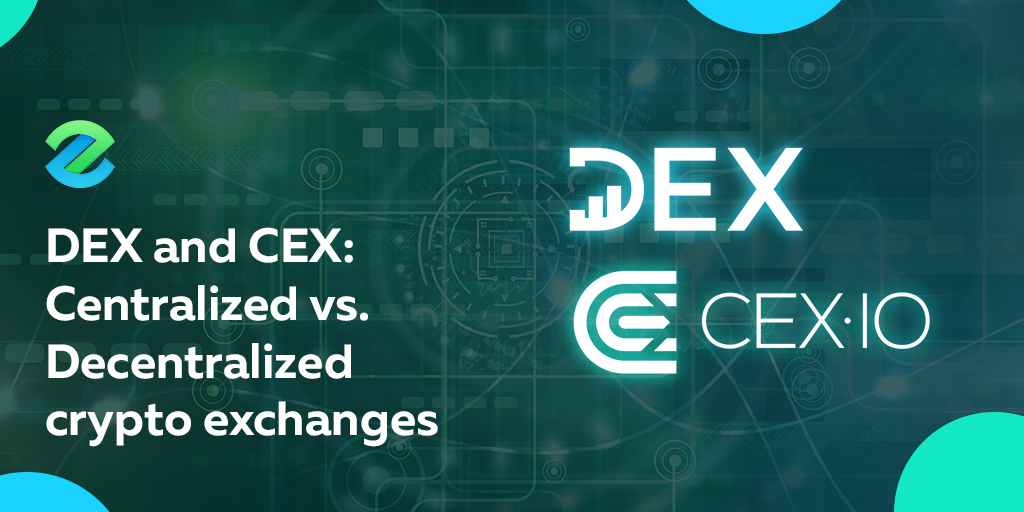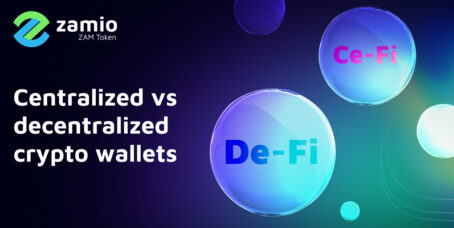An exchange is a physical or virtual place where buyers and sellers meet to exchange their assets, such as currencies, gold, silver, and stocks. The exchange acts as a third party that facilitates the trade by connecting buyers and sellers.
With the advancement of technology, most trades take place online, usually on virtual and centralized exchanges. A centralized exchange (CEX) is owned, managed, and controlled by a third party or central authority such as a company, individual, or government.
However, with the emergence of cryptocurrencies such as Bitcoin, a new form of crypto exchange has surfaced: decentralized crypto exchange. A decentralized exchange (DEX) has no central authority and is managed by an automated process allowing users to trade directly without an intermediary while remaining anonymous.
In this article, we will discuss the difference between CEX and DEX in the context of cryptocurrencies.
Table of Contents
Centralized exchange (CEX)
A centralized exchange (CEX) is a legally registered trading platform where users create an account, deposit money, and trade on the exchange platform. Nearly all crypto are traded on CEX because it is simple to use, reliable, and highly liquid.
However, since most CEXs are regulated, they must collect personal information about their users, negating one of the fundamental principles of cryptocurrencies, which is anonymity. However, few centralized exchanges, such as Kucoin, don’t ask for personal information after registering, though this might change in the future.
Moreover, accounts registered in CEX are subject to law oversight and could be confiscated or blocked by authorities.
CEX is also less secure since it is prone to hacking and other malicious activities. To mitigate this risk, you should always choose a reputable exchange with a solid security track record.
How CEX work
Using a centralized exchange is very simple. You register online by creating a new account on the platform’s website. After you log in, you must submit your ID to verify your identity before trading. The length of the verification process depends on the exchange, but it usually takes 24 hours.
Now you can buy and sell crypto through the exchange platform. If you don’t own any cryptocurrencies, you can buy your first cryptocurrency by using your credit card.
The platform will charge a fee of usually 2% to conduct the transaction. After you make the purchase, your wallet, which the exchange controls, is credited with the type and amount of crypto you bought. Now you can trade your crypto with other cryptos.
Main disadvantages of CEX
- Subject to local laws and regulations
- Acts as an intermediary in all trading operations
- Stores private user data on its servers
- Has complete control over user funds
- Restrict registration in certain countries
- Prone to security breaches
- May limits deposits, withdrawal, and trading volume
Main Advantages of DEX
- Simplicity: user-friendly and great for beginners.
- Liquidity: high trading volume.
- Reliability: function and perform as expected and offer a layer of security.
Examples of crypto CEX
The following are among the most popular centralized crypto exchanges in the world:
- Binance
- Coinbase
- Kraken
- Gate.io
- Bitstamp
Disclaimer: this list is not an endorsement. Always conduct your own research before you sign up for any exchange.
Centralized exchanges do not list all available cryptocurrencies and tokens in the market. This is not necessarily a bad thing. Reputable and trustworthy exchanges may require new crypto projects to go through a tendinous process before approving their coin. However, if you feel the need to buy a coin not listed on your exchange, you may find it on the following exchanges:
- HitBTC
- KuCoin
- CryptoCompare
Decentralized Exchange (DEX)
A decentralized exchange is a peer-to-peer (p2p) trading platform where users exchange cryptocurrencies directly without an intermediary and the need to trust a third party.
Many users prefer DEX due to its anonymity, security, and absence of intermediaries. A centralized exchange can restrict your access to your account, and therefore to funds. It also limits your trading volume and can be attacked by hackers.
With DEX, you do not share your wallet’s private key or go through the identification process. Your wallet records your transaction history and balance, and you are solely responsible for its security and custody.
Recommended reading: types of crypto wallets
DEX disadvantages
While DEX solves many of the issues or disadvantages of CEX, it has its shortcomings, which include:
- Unavailability of fiat/crypto trading (you must buy crypto with fiat currency through CEX)
- Complexity (harder to manage by beginners)
- Lack of advanced trading tools and options, such as stop losses order.
- Low liquidity since most traders prefer using CEX.
- Inability to reverse transactions or reach someone for technical support.
Some decentralized exchanges constantly update their application to solve existing problems, such as liquidity.
How DEX work
Many developers have successfully built decentralized exchange applications, such as Uniswap, by utilizing the functionality of smart contacts of different blockchains, such as Etheuerm and EOS.
These applications are user-friendly interfaces that help users trade directly with each other. The application automatically matches buyers and sellers.
Behind the scenes, both buyers and sellers are transacting using a smart contract. The smart contract locks the funds of both parties. The trade is only executed automatically when the predefined terms of the contract are met.
Recommended reading: what are smart contacts?
DEX advantages
- Secure
- Anonymous
- Hand control of funds to users
- Free from regulations
- Lower transaction fees
DEX examples
- Uniswap
- Sushiswap
- Compound
- Curve Finance
- PancakeSwap
Never neglect due diligence when choosing an exchange, whether centralized or decentralized.









